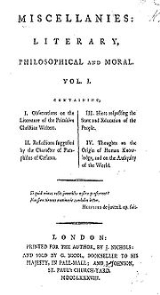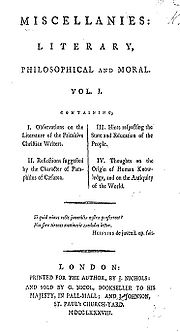
Thomas Christie
Encyclopedia

Analytical Review
The Analytical Review was a periodical established in London in 1788 by the publisher Joseph Johnson and the writer Thomas Christie. Part of the Republic of Letters, it was a gadfly publication, which offered readers summaries and analyses of the many new publications issued at the end of the...
.
Christie was born to Alexander Christie (brother of the Unitarian
Unitarianism
Unitarianism is a Christian theological movement, named for its understanding of God as one person, in direct contrast to Trinitarianism which defines God as three persons coexisting consubstantially as one in being....
writer William Christie
William Christie (Unitarian)
William Christie was a Scottish Unitarian writer, one of the earliest apostles of Unitarianism in Scotland and America.-Life:He was a son of Thomas Christie, merchant and provost of Montrose, and uncle of Thomas Christie the political writer. He was born at Montrose, and educated at the grammar...
), a merchant in Montrose
Montrose, Angus
Montrose is a coastal resort town and former royal burgh in Angus, Scotland. It is situated 38 miles north of Dundee between the mouths of the North and South Esk rivers...
, Scotland
Scotland
Scotland is a country that is part of the United Kingdom. Occupying the northern third of the island of Great Britain, it shares a border with England to the south and is bounded by the North Sea to the east, the Atlantic Ocean to the north and west, and the North Channel and Irish Sea to the...
. Christie attended a local grammar school and subsequently became a clerk in a bank. Deciding that he was more interested in literature and science, Christie studied medicine independently and then matriculated at the Westminster General Dispensary in London
London
London is the capital city of :England and the :United Kingdom, the largest metropolitan area in the United Kingdom, and the largest urban zone in the European Union by most measures. Located on the River Thames, London has been a major settlement for two millennia, its history going back to its...
in 1784. At the same time, he began writing a series of articles on natural history for the Gentleman's Magazine and became friends with its editor, John Nichols
John Nichols (printer)
John Nichols was an English printer, author and antiquary.-Early life and apprenticeship:He was born in Islington, London to Edward Nichols and Anne Wilmot. On 22 June 1766 he married Anne Cradock daughter of William Cradock...
. Although he attended the University of Edinburgh
University of Edinburgh
The University of Edinburgh, founded in 1583, is a public research university located in Edinburgh, the capital of Scotland, and a UNESCO World Heritage Site. The university is deeply embedded in the fabric of the city, with many of the buildings in the historic Old Town belonging to the university...
in 1785 and 1786 to earn his medical degree, he left the program to dedicate himself to a life of letters.
In 1787 Christie took a six-month tour of Britain, visiting almost every important town. He met and began a correspondence with Anna Seward
Anna Seward
Anna Seward was an English Romantic poet, often called the Swan of Lichfield.-Life:Seward was the elder daughter of Thomas Seward , prebendary of Lichfield and Salisbury, and author...
, a poet living in Lichfield
Lichfield
Lichfield is a cathedral city, civil parish and district in Staffordshire, England. One of eight civil parishes with city status in England, Lichfield is situated roughly north of Birmingham...
; he also made the acquaintance of the naturalist
Naturalist
Naturalist may refer to:* Practitioner of natural history* Conservationist* Advocate of naturalism * Naturalist , autobiography-See also:* The American Naturalist, periodical* Naturalism...
and poet Erasmus Darwin
Erasmus Darwin
Erasmus Darwin was an English physician who turned down George III's invitation to be a physician to the King. One of the key thinkers of the Midlands Enlightenment, he was also a natural philosopher, physiologist, slave trade abolitionist,inventor and poet...
, the naturalist
Naturalist
Naturalist may refer to:* Practitioner of natural history* Conservationist* Advocate of naturalism * Naturalist , autobiography-See also:* The American Naturalist, periodical* Naturalism...
and antiquary Thomas Pennant
Thomas Pennant
Thomas Pennant was a Welsh naturalist and antiquary.The Pennants were a Welsh gentry family from the parish of Whitford, Flintshire, who had built up a modest estate at Bychton by the seventeenth century...
and the Dissenting
English Dissenters
English Dissenters were Christians who separated from the Church of England in the 16th, 17th and 18th centuries.They originally agitated for a wide reaching Protestant Reformation of the Established Church, and triumphed briefly under Oliver Cromwell....
minister and scientist Joseph Priestley
Joseph Priestley
Joseph Priestley, FRS was an 18th-century English theologian, Dissenting clergyman, natural philosopher, chemist, educator, and political theorist who published over 150 works...
.
In 1788 Christie and Joseph Johnson
Joseph Johnson (publisher)
Joseph Johnson was an influential 18th-century London bookseller and publisher. His publications covered a wide variety of genres and a broad spectrum of opinions on important issues...
founded the highly influential Analytical Review
Analytical Review
The Analytical Review was a periodical established in London in 1788 by the publisher Joseph Johnson and the writer Thomas Christie. Part of the Republic of Letters, it was a gadfly publication, which offered readers summaries and analyses of the many new publications issued at the end of the...
, a periodical dedicated to open inquiry. It became the mouthpiece for reformers during the 1790s. A year later, he published the first part of Miscellanies, Philosophical, Medical, and Moral, the work for he which is best known. It discusses topics ranging from theology to public education to history.
During 1790 Christie spent six months in Paris, meeting many important French revolution
French Revolution
The French Revolution , sometimes distinguished as the 'Great French Revolution' , was a period of radical social and political upheaval in France and Europe. The absolute monarchy that had ruled France for centuries collapsed in three years...
aries such as Mirabeau
Honoré Gabriel Riqueti, comte de Mirabeau
Honoré Gabriel Riqueti, comte de Mirabeau was a French revolutionary, as well as a writer, diplomat, freemason, journalist and French politician at the same time. He was a popular orator and statesman. During the French Revolution, he was a moderate, favoring a constitutional monarchy built on...
, Sieyès and Necker
Jacques Necker
Jacques Necker was a French statesman of Swiss birth and finance minister of Louis XVI, a post he held in the lead-up to the French Revolution in 1789.-Early life:...
. Upon his return to Britain, he became a loyal supporter of the revolution and published A Sketch of the New Constitution of France. In 1791, he was one of the many who participated in the Revolution Controversy
Revolution Controversy
The Revolution Controversy was a British debate over the French Revolution, lasting from 1789 through 1795. A pamphlet war began in earnest after the publication of Edmund Burke's Reflections on the Revolution in France , which surprisingly supported the French aristocracy...
begun by Edmund Burke's
Edmund Burke
Edmund Burke PC was an Irish statesman, author, orator, political theorist and philosopher who, after moving to England, served for many years in the House of Commons of Great Britain as a member of the Whig party....
Reflections on the Revolution in France
Reflections on the Revolution in France
Reflections on the Revolution in France , by Edmund Burke, is one of the best-known intellectual attacks against the French Revolution...
(1790). His reply, Letters on the Revolution in France and the New Constitution, described his impressions of Paris and provided a contrast to Burke's depiction of it as lawless and violent. In 1792 he returned to Paris and was asked by the National Assembly
National Assembly (French Revolution)
During the French Revolution, the National Assembly , which existed from June 17 to July 9, 1789, was a transitional body between the Estates-General and the National Constituent Assembly.-Background:...
to help translate a polyglot edition of the constitution.
On 9 September 1792 Christie married a Miss Thomson and entered into a partnership with her grandfather's successful London carpet manufacturing business. In 1796 he traveled to Suriname
Suriname
Suriname , officially the Republic of Suriname , is a country in northern South America. It borders French Guiana to the east, Guyana to the west, Brazil to the south, and on the north by the Atlantic Ocean. Suriname was a former colony of the British and of the Dutch, and was previously known as...
on business and died there.

